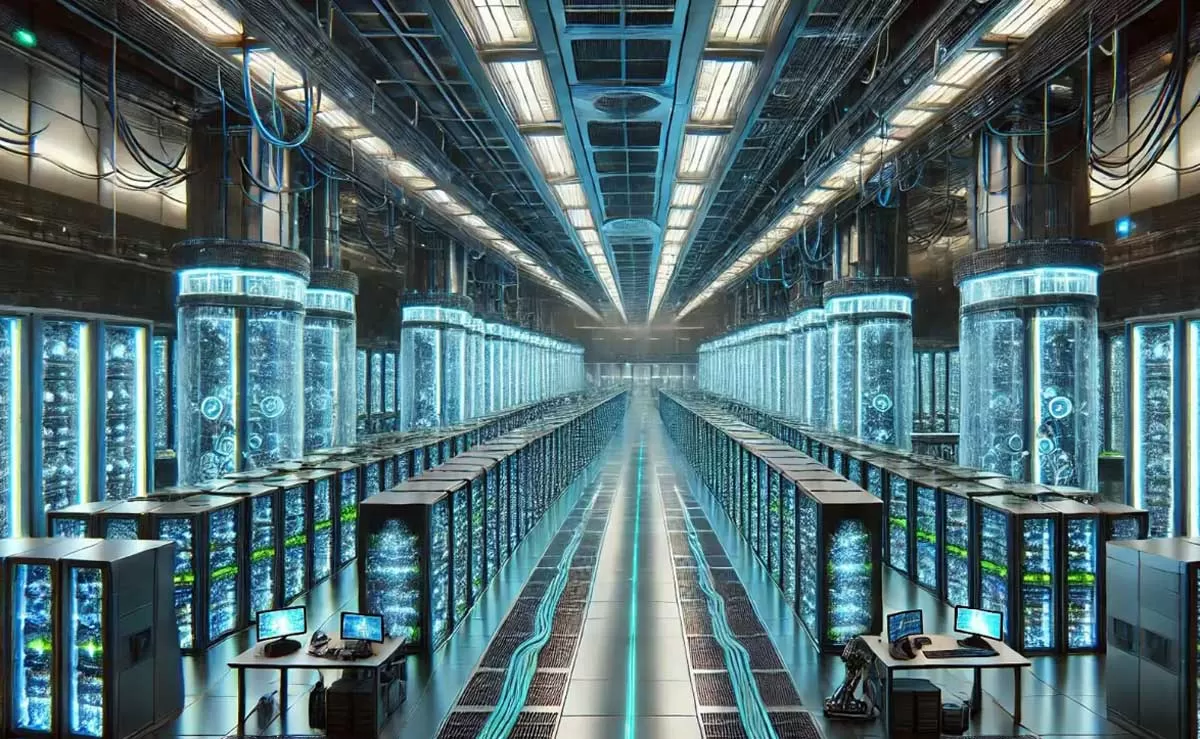India is on the path to becoming a global data centre hub, driven by a surge in digital adoption, AI expansion and government-backed infrastructure initiatives. According to the Economic Survey, the country’s data centre market is set to grow from $ 4.5 billion in 2023 to $ 11.6 billion by 2032, achieving a CAGR of 10.98 per cent. The expansion reflects rising demand for digital services and the ongoing development of robust IT infrastructure. In the past two years, the sector has seen key collaborations between chip developers and infrastructure providers, such as NVIDIA partnering with Yotta and Tata Group and Reliance Jio Infocomm joining forces across various initiatives. A key segment in real estate“The growing adoption of hybrid cloud models, including private and public cloud environments, has created new opportunities in real estate,” says Kirtikar Ojha, Head of Business Development & Government Sales & CMO, L&T-Cloudfiniti. “Additionally, urbanisation and edge computing have led to the rise of smaller, localised data centres in cities to facilitate low-latency processing.”Data centres often offer higher returns on investment (RoI) owing to strong demand and long-term leases. However, they also require substantial initial capital and pose technological risks. Compared to traditional real estate, which can be volatile but offers capital appreciation, data centres provide stable cash flows and predictable returns, making them an increasingly attractive asset class.Jatin Shah, Chief Strategy Officer, Colliers, states, “Developers have a pipeline of over 3 gigawatts (gw) set to be delivered over the next decade. This requires an estimated capital expenditure of approximately $ 25 billion, offering a great opportunity for investors.”Concentration in major hubsCurrently, 94 per cent of India’s data centre capacity is concentrated in seven major cities. Mumbai and Chennai are leading the sector because of their well-established infrastructure networks. “Mumbai alone accounts for 48 per cent of India’s total data centre capacity, benefiting from submarine cable landing stations, reliable power supply and dense fibre infrastructure,” says Shah. “The city is set to absorb over 35 per cent of the total additional capacity in the next five years.” Chennai is also experiencing strong demand owing to similar advantages and the recent landing of the MIST cable, which is expected to attract further interest from the Asia-Pacific (APAC) region.Design considerationsHighlighting the key design imperatives for data centres, Pankaj R Wadhwa, Principal Architect, Vastunidhi Architects, underscores the importance of compliance. “A data centre’s design must adhere to TIA-942 Standards, Uptime Tier-III/IV guidelines and the National Building Code,” he explains. To ensure uninterrupted operations, “the infrastructure must incorporate redundant pathways for critical services, such as electrical systems and HVAC, allowing for seamless maintenance without downtime.” Security is also paramount, requiring a seven-layer physical security system. Additionally, the seismic design must ensure structural integrity and functionality during and after an earthquake. Given that data centres operate 24/7/365, he emphasises that reliability and zero downtime are non-negotiable priorities.Challenges in constructionOne of the biggest challenges in developing data centres in India is the high cost and limited availability of land near commercial hubs. Expensive land parcels drive up both operational and rental costs, making projects in high-demand areas like Mumbai even more costly. Shah explains another key challenge, “As technology evolves, older data centres risk becoming obsolete. Selling these facilities at profitable rates may prove difficult for investors.”Impact on leasing and transactionsOperators require customised facilities with cutting-edge cooling systems, high-security measures and redundant power infrastructure, making lease agreements more complex. “Due to the high capital investment involved, longer lease terms are becoming the norm, ensuring stability and predictable returns,” shares Shah. “The sector is also attracting major interest from real-estate funds and infrastructure investors, offering opportunities for commercial property owners and brokers.” As a result, leasing strategies are evolving, with agreements now including provisions for high power usage, dedicated infrastructure and tenant-specific customisation.Evolving demand and market India’s data centre sector is poised for significant growth, with Generative AI expanding at a CAGR of 28 per cent during 2023-2030. “High-density requirements (above 30 kW per rack) will reshape demand, while sustainability and ESG priorities will drive innovation in cooling and energy solutions,” predicts Anshuman Magazine, Chairman & CEO - India, Southeast Asia, Middle East & Africa, CBRE. “Expansion into Tier-2 cities, hyper-converged infrastructure and cumulative investments exceeding $ 100 billion by 2027 will cement India’s position as a major global data centre hub.”As for L&T’s plans, Ojha reveals, “As part of our strategic expansion, we are deploying AI-ready data centres across key metro hubs including Panvel (Navi Mumbai), Mahape (Navi Mumbai) and Whitefield (Bengaluru). These locations ensure low-latency connectivity, scalability, and energy-efficiency, offering enterprises and hyperscalers secure cloud solutions.”The road aheadWith India’s data centre industry expected to add 604 mw capacity requiring $ 3.8 billion in investment and 7.3 million sq ft of real estate by 2026, the sector presents enormous growth potential for developers and investors. Beyond the primary data centre hubs, emerging cities like Ahmedabad, Gurugram, Noida and Kolkata are rapidly gaining traction. Further, the Indian Government is actively encouraging investment through tax incentives, land and power subsidies, and the establishment of Data Centre Economic Zones (DCEZs).
Key requirements for a data centre
Designing a data centre presents unique challenges owing to its city-scale infrastructure requirements. Pankaj R Wadhwa, Principal Architect, Vastunidhi Architects, outlines essential requirements
Power stability: Requires a 220kV substation and million-litre water storage for uninterrupted operations
Backup power: Must be equipped with high-capacity gensets and million-litre HSD storage for outage resilience
HVAC efficiency: Needs high-performance chillers and precision air-conditioning for climate control
Structural strength: Floors must support 2,000-2,500 kg/sq m for heavy server racks and equipment.
No. of Data Centres in India as in February 2025Source: Colliers





















